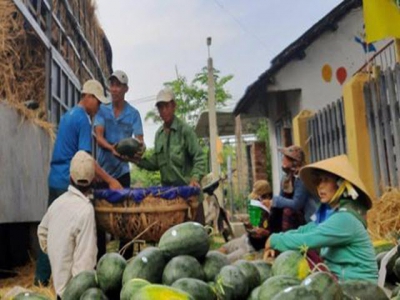Vietnams veggies and fruits can no longer cross the border to enter China

Vietnam’s vegetables and fruits are finding it difficult to enter China, but the country continues to import Chinese products in large quantities.
The General Department of Customs (GDC) reported that export turnover of vegetables and fruits to China, the biggest market for Vietnam, dropped sharply by 44.2 percent in July to $144.2 million.
Vietnam’s veggies and fruits can no longer cross the border to enter China
As such, in the first seven months of the year, exports to China witnessed a decrease of 8.1 percent in turnover in comparison with the same period last year to $1.6 billion.
However, while China has restricted imports from Vietnam, it still exports vegetables and fruits in large quantities to Vietnam.
Together with Thailand, the US and Australia, China is among the four biggest suppliers for Vietnam.
Vietnam spent $270 million to import products from China, a sharp increase of 58 percent compared with the same period last year.
The General Department of Customs (GDC) reported that export turnover of vegetables and fruits to China, the biggest market for Vietnam, dropped sharply by 44.2 percent in July to $144.2 million.
Nguyen Van Nam, former director of the Trade Research Institute, though emphasizing that the real figure could be higher because some products still can be exported across border gates, commented that the situation has become worrying.
China is a vast market with diverse demands and different market segments. Previously, Vietnamese producers and businesses mostly made low-cost products to target low-income earners, and mostly exported products through unofficial channels across border gates.
However, China has changed its trade policy in recent years, boosting imports through official channels and reducing imports across border gates.
The move shows China clear policy: when the economy was in low development, it opened the market to facilitate Chinese businesses and help them make profits, but now it is at a higher development level and has tightened management over imports.
How about Vietnam? Ministries, in all resolutions and legal documents, affirm that Vietnam encourages trade through official channels, but has no detailed and clear policies to reach that goal.
Since Vietnamese farmers and businesses are used to cross-border exports, they did not immediately adapt to the new circumstances when China restricted cross-border imports and tightened control over the quality of imports.
“Exports going through official channels must meet quality requirements on packaging, labeling and origin. Many Vietnamese products cannot meet standards to go through official channels,” Nam said.
However, low-quality Chinese products still can cross border gates to penetrate the Vietnamese market very easily.
Some experts have called on Vietnam to tighten control over Chinese imports, saying that it is unfair for Vietnam to unilaterally open its market widely.
Có thể bạn quan tâm
 Tây Ninh custard apple farmers embrace VietGAP standards
Tây Ninh custard apple farmers embrace VietGAP standards The southeastern province of Tây Ninh, the country’s largest custard apple producer, is growing the fruit to good agricultural practice (GAP) standards
 Young people not interested in agricultural studies
Young people not interested in agricultural studies The agriculture, forestry and fishery sector lacks high-qualified human resources but few young people want to work in the sector despite the abundant job
 Nets on jujube orchards protect plants, reduce pesticide use
Nets on jujube orchards protect plants, reduce pesticide use Farmers' use of nets in jujube orchards has reduced spoiled fruit to only 5-10 per cent compared to a loss of 30-40 per cent at other orchards that use pesticid